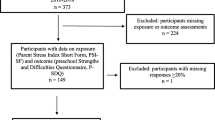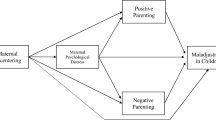Abstract
Purpose
This study aimed to investigate the association between parenting stress, maternal depressive symptoms, and use of physical punishment when the child is 10 years old.
Methods
Data from the Tokyo Early Adolescence Survey on early adolescents and primary caregivers (N = 4478) were used. Frequency of using physical punishment, level of depressive symptoms (Kessler Psychological Distress Scale 6), and maternal parenting stress experienced at 1, 3, 9, 18, and 36 months after birth were evaluated. Multiple linear and multinomial logistic regression analyses were conducted.
Results
Mothers (1633) who provided information on parenting stress at all the five points were included for the analysis. After controlling for the child’s age, sex, birth weight, maternal age, and annual household income, presence of maternal parenting stress at every time point, except at three months after birth, was significantly associated with an increased risk of using physical punishment with the 10-year-old. After adjusting for levels of depressive symptoms, significant associations were found between use of physical punishment and maternal parenting stress at 1 month (adjusted odds ratio [OR] 1.71, 95% confidence interval [Cl] 1.12–2.61) and 36 months (adjusted OR 1.70, 95% CI 1.10–2.61) after birth.
Conclusion
Maternal parenting stress experienced at 1 and 36 months after birth predicted use of physical punishment, even after adjusting for maternal depressive symptoms. Maternal support should, therefore, be provided to mothers to cope with parenting stress even three years after birth to prevent the use of physical punishment in early adolescence.

Similar content being viewed by others
Data availability
The data analysed in this study is subject to the following licences/restrictions: Data from TTC is archived in the Tokyo Metropolitan Institute of Medical Science. Collaboration in data analysis and publication will be welcome through specific research proposals sent to the research committee. The initial contact for request should be addressed to Atsushi Nishida, [nishida-at@igakuken.or.jp].
Code availability
No code was used in this study.
References
Miller-Perrin C, Perrin R (2018) Physical punishment of children by US parents: moving beyond debate to promote children’s health and well-being. Psicol-Reflex Crit 31:16. https://doi.org/10.1186/s41155-018-0096-x
Straus MA (2010) Prevalence, societal causes, and trends in corporal punishment by parents in world perspective. Law Contemp Probl 73:1–30
MacMillan HL, Boyle MH, Wong MY, Duku EK, Fleming JE, Walsh CA (1999) Slapping and spanking in childhood and its association with lifetime prevalence of psychiatric disorders in a general population sample. Can Med Assoc J 161:805–809
Wang MT, Kenny S (2014) Parental physical punishment and adolescent adjustment: bidirectionality and the moderation effects of child ethnicity and parental warmth. J Abnorm Child Psychol 42:717–730. https://doi.org/10.1007/s10802-013-9827-8
Afifi TO, Ford D, Gershoff ET, Merrick M, Grogan-Kaylor A, Ports KA, MacMillan HL, Holden GW, Taylor CA, Lee SJ, Bennett RP (2017) Spanking and adult mental health impairment: the case for the designation of spanking as an adverse childhood experience. Child Abuse Negl 71:24–31. https://doi.org/10.1016/j.chiabu.2017.01.014
Taylor CA, Guterman NB, Lee SJ, Rathouz PJ (2009) Intimate partner violence, maternal stress, nativity, and risk for maternal maltreatment of young children. Am J Public Health 99:175–183. https://doi.org/10.2105/AJPH.2007.126722
Lee SJ, Grogan-Kaylor A, Berger LM (2014) Parental spanking of 1-year-old children and subsequent child protective services involvement. Child Abuse Negl 38:875–883. https://doi.org/10.1016/j.chiabu.2014.01.018
Latham RM, Quilter E, Arseneault L, Danese A, Moffitt TE, Newbury JB, Fisher HL (2021) Childhood maltreatment and poor functional outcomes at the transition to adulthood: a comparison of prospective informant- and retrospective self-reports of maltreatment. Soc Psychiatry Psychiatr Epidemiol 56:1161–1173. https://doi.org/10.1007/s00127-020-01926-5
Scott KM, Smith DR, Ellis PM (2010) Prospectively ascertained child maltreatment and its association with DSM-IV mental disorders in young adults. Arch Gen Psychiatry 67:712–719. https://doi.org/10.1001/archgenpsychiatry.2010.71
Humphreys KL, LeMoult J, Wear JG, Piersiak HA, Lee A, Gotlib IH (2020) Child maltreatment and depression: a meta-analysis of studies using the Childhood Trauma Questionnaire. Child Abuse Negl 102:104361. https://doi.org/10.1016/j.chiabu.2020.104361
Lansford JE, Sharma C, Malone PS et al (2014) Corporal punishment, maternal warmth, and child adjustment: a longitudinal study in eight countries. J Clin Child Adolesc Psychol 43:670–685. https://doi.org/10.1080/15374416.2014.893518
Straus MA, Stewart JH (1999) Corporal punishment by American parents: national data on prevalence, chronicity, severity, and duration, in relation to child and family characteristics. Clin Child Fam Psychol Rev 2:55–70. https://doi.org/10.1023/a:1021891529770
Fujikawa S, Ando S, Nishida A et al (2018) Disciplinary slapping is associated with bullying involvement regardless of warm parenting in early adolescence. J Adolesc 68:207–216. https://doi.org/10.1016/j.adolescence.2018.07.018
Lansford JE, Alampay LP, Al-Hassan S et al (2010) Corporal punishment of children in nine countries as a function of child gender and parent gender. Int J Pediatr 2010:672780. https://doi.org/10.1155/2010/672780
Wilson LM, Lorber MF, Timmons Fritz PA (2018) A dynamic approach to risk factors for maternal corporal punishment in early to middle childhood. J Child Fam Stud 27:953–965. https://doi.org/10.1007/s10826-017-0929-8
Fredriksen E, von Soest T, Smith L, Moe V (2019) Parenting stress plays a mediating role in the prediction of early child development from both parents’ perinatal depressive symptoms. J Abnorm Child Psychol 47:149–164. https://doi.org/10.1007/s10802-018-0428-4
Najman JM, Plotnikova M, Williams GM, Alati R, Mamun AA, Scott J, Wray N, Clavarino AM (2017) Trajectories of maternal depression: a 27-year population-based prospective study. Epidemiol Psychiatr Sci 26:79–88. https://doi.org/10.1017/S2045796015001109
Ando S, Nishida A, Yamasaki S et al (2019) Cohort profile: the Tokyo Teen Cohort study (TTC). Int J Epidemiol 48:1414–1414g. https://doi.org/10.1093/ije/dyz033
Ichikawa K, Fujiwara T, Nakayama T (2015) Effectiveness of home visits in pregnancy as a public health measure to improve birth outcomes. PLoS ONE 10:e0137307. https://doi.org/10.1371/journal.pone.0137307
Ministry of Health, Labour and Welfare (2019) Report on regional public health services and health promotion services. https://www.mhlw.go.jp/toukei/saikin/hw/c-hoken/18/dl/kekka1.pdf. Accessed 26 March 2021.
Kessler RC, Green JG, Gruber MJ et al (2010) Screening for serious mental illness in the general population with the K6 screening scale: results from the WHO World Mental Health (WMH) survey initiative. Int J Methods Psychiatr Res 19(Suppl 1):4–22. https://doi.org/10.1002/mpr.310
Furukawa TA, Kawakami N, Saitoh M et al (2008) The performance of the Japanese version of the K6 and K10 in the World Mental Health Survey Japan. Int J Methods Psychiatr Res 17:152–158. https://doi.org/10.1002/mpr.257
Mackenzie MJ, Nicklas E, Brooks-Gunn J, Waldfogel J (2011) Who spanks infants and toddlers? Evidence from the Fragile Families and Child Well-Being Study. Child Youth Serv Rev 33:1364–1373. https://doi.org/10.1016/j.childyouth.2011.04.007
Perron JL, Lee CM, Laroche KJ, Ateah C, Clément M-È, Chan K (2014) Child and parent characteristics associated with Canadian parents’ reports of spanking. Can J Commun Ment Health 33:31–45. https://doi.org/10.7870/cjcmh-2014-014
World Health Organization (2020) ICD-11 for Mortality and Morbidity Statistics (Version: 09/2020). https://icd.who.int/browse11/l-m/en#/http://id.who.int/icd/entity/2041060050. Accessed 15 February 2021.
Cham H, Reshetnyak E, Rosenfeld B, Breitbart W (2017) Full information maximum likelihood estimation for latent variable interactions with incomplete indicators. Multivariate Behav Res 52:12–30. https://doi.org/10.1080/00273171.2016.1245600
Chung EK, McCollum KF, Elo IT et al (2004) Maternal depressive symptoms and infant health practices among low-income women. Pediatrics 113:e523–e529. https://doi.org/10.1542/peds.113.6.e523
Kavanaugh M, Halterman JS, Montes G et al (2006) Maternal depressive symptoms are adversely associated with prevention practices and parenting behaviors for preschool children. Ambul Pediatr 6:32–37. https://doi.org/10.1016/j.ambp.2005.09.002
Anthony LG, Anthony BJ, Glanville DN, Naiman DQ, Waanders C, Shaffer S (2005) The relationships between parenting stress, parenting behaviour and preschoolers’ social competence and behaviour problems in the classroom. Infant Child Dev 14:133–154. https://doi.org/10.1002/icd.385
Liu L, Wang M (2015) Parenting stress and harsh discipline in China: The moderating roles of marital satisfaction and parent gender. Child Abuse Negl 43:73–82. https://doi.org/10.1016/j.chiabu.2015.01.014
Colman I, Ploubidis GB, Wadsworth ME, Jones PB, Croudace TJ (2007) A longitudinal typology of symptoms of depression and anxiety over the life course. Biol Psychiatry 62:1265–1271. https://doi.org/10.1016/j.biopsych.2007.05.012
Giallo R, Cooklin A, Nicholson JM (2014) Risk factors associated with trajectories of mothers’ depressive symptoms across the early parenting period: An Australian population-based longitudinal study. Arch Womens Ment Health 17:115–125. https://doi.org/10.1007/s00737-014-0411-1
Ponguta LA, Issa G, Aoudeh L et al (2020) Effects of the Mother-Child Education Program on parenting stress and disciplinary practices among refugee and other marginalized communities in Lebanon: a pilot randomized controlled trial. J Am Acad Child Adolesc Psychiatry 59:727–738. https://doi.org/10.1016/j.jaac.2019.12.010
Dubowitz H, Lane WG, Semiatin JN, Magder LS (2012) The SEEK model of pediatric primary care: can child maltreatment be prevented in a low-risk population? Acad Pediatr 12:259–268. https://doi.org/10.1016/j.acap.2012.03.005
Canfield CF, Weisleder A, Cates CB, Huberman HS, Dreyer BP, Legano LA, Johnson SB, Seery A, Mendelsohn AL (2015) Primary care parenting intervention and its effects on the use of physical punishment among low-income parents of toddlers. J Dev Behav Pediatr 36:586–593. https://doi.org/10.1097/DBP.0000000000000206
MacKenzie MJ, Nicklas E, Brooks-Gunn J, Waldfogel J (2015) Spanking and children’s externalizing behavior across the first decade of life: Evidence for transactional processes. J Youth Adolesc 44:658–669. https://doi.org/10.1007/s10964-014-0114-y
Afifi TO, Fortier J, MacMillan HL, Gonzalez A, Kimber M, Georgiades K, Duncan L, Taillieu T, Davila IG, Struck S (2019) Examining the relationships between parent experiences and youth self-reports of slapping/spanking: A population-based cross-sectional study. BMC Public Health 19:1345. https://doi.org/10.1186/s12889-019-7729-6
Callender KA, Olson SL, Choe DE, Sameroff AJ (2012) The effects of parental depressive symptoms, appraisals, and physical punishment on later child externalizing behavior. J Abnorm Child Psychol 40:471–483. https://doi.org/10.1007/s10802-011-9572-9
Acknowledgements
This work is part of the Tokyo Teen Cohort study, and we would like to thank all researchers, investigators, and participants for their substantial support in sample collection and management. We acknowledge the support of the research team at the Mental Health Promotion Unit, Research Centre for Social Science & Medicine, Tokyo Metropolitan Institute of Medical Science. The funding bodies had no role in the study design; in the collection, analysis and interpretation of data; in the writing of the report; and in the decision to submit the article for publication.
Funding
This study was supported by a Japan Scientific Research Grant on an Innovative Area from the Ministry of Education, Culture, Sports, Science and Technology (MEXT KAKENHI 23118002); a Japan Scientific Research Grant on an Innovative Area from the Japan Society for the Promotion of Science (JSPS KAKENHI 16H06395, 16H06398, 16K21720); a Grant-in-Aid for Challenging Exploratory Research from the Japan Society for the Promotion of Science (JSPS KAKENHI 16K13499); a Grant-in-Aid for Scientific Research (B) from the Japan Society for the Promotion of Science (JSPS KAKENHI 16H03745); MEXT Grant-in-Aid for Transformative Research Areas (JP21H05171, JP21H05173 and JP21H05174); and a Tokyo Metropolitan Institute of Medical Science Project Grant (Kokoronokenko H27-H31). The funding bodies had no role in the study design; in the collection, analysis and interpretation of data; in the writing of the report; and in the decision to submit the article for publication.
Author information
Authors and Affiliations
Contributions
Conceptualisation: JN, MN, SSY, SA, SK, SF, YM, KE, MHH, KK, AN,; Methodology: JN, MN, SY, SA, SK, SF, YM, KE, MHH, KK, AN; Formal analysis and investigation: MN, SY, KE; Writing – original draft preparation: JN; Writing – review and editing: MN, SY, SA, SK, SF, YM, KE, MHH, KK, AN; Funding acquisition: SA, MHH, KK, AN; Resources: SA, KK, AN; Supervision: MN, SY, SA, SK, SF, YM, KE, MHH, KK, AN.
Corresponding author
Ethics declarations
Conflict of interest
There are no conflicts of interest to declare.
Consent to participate
All study participants provided informed consent, and the study design was approved by the appropriate ethics review boards.
Consent for publication
Consent for publication was taken from all authors.
Ethical approval
The authors confirm that all procedures contributing to this work comply with the ethical standards of the relevant national and institutional committees on human experimentation and with the Helsinki Declaration of 1975, as revised in 2000. The study protocol was reviewed and approved by the institutional review boards of the Tokyo Metropolitan Institute of Medical Science (Approval number: 12–35), SOKENDAI (Graduate University for Advanced Studies [Approval number: 2012002]), and the University of Tokyo (Approval number: 10057).
Supplementary Information
Below is the link to the electronic supplementary material.
Rights and permissions
About this article
Cite this article
Niimura, J., Nakanishi, M., Yamasaki, S. et al. Maternal parenting stress from birth to 36 months, maternal depressive symptoms, and physical punishment to 10-year-old children: a population-based birth cohort study. Soc Psychiatry Psychiatr Epidemiol 57, 2207–2215 (2022). https://doi.org/10.1007/s00127-022-02319-6
Received:
Accepted:
Published:
Issue Date:
DOI: https://doi.org/10.1007/s00127-022-02319-6




